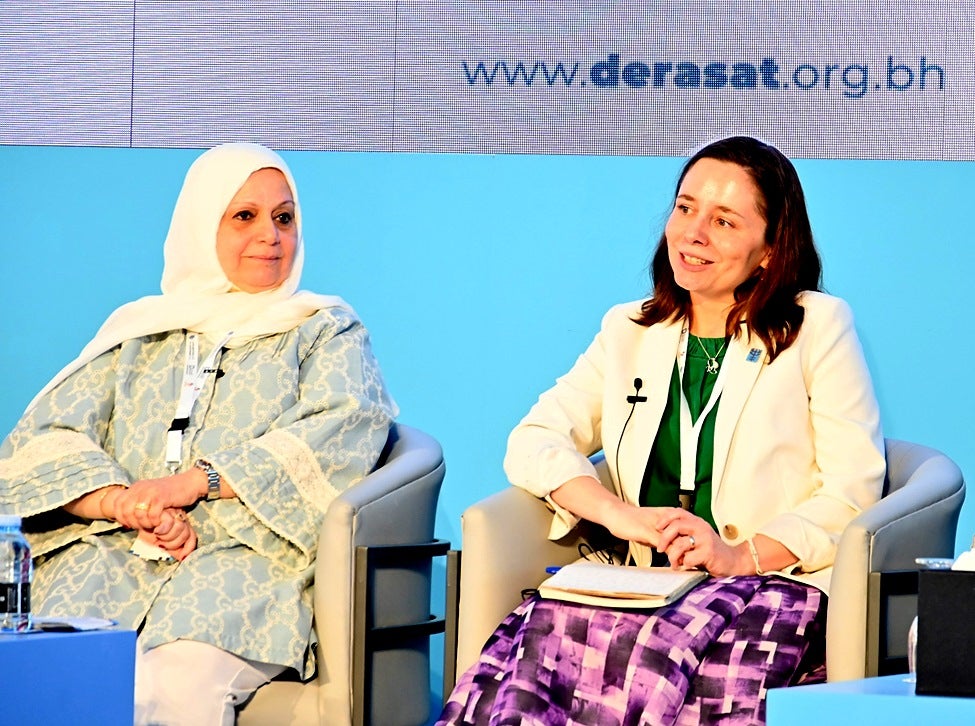UN Women Bahrain participates in the Derasat 6th Annual Forum to examine women’s leadership in research and decision-making
Date:

On 14 and 15 June, the Bahrain Centre for Strategic International and Energy Studies (Derasat) convened its 6th Annual Forum on “The Role of Women in Policy-Making, Think Tanks, and Research”. This was the first time that Derasat’s flagship event had focused squarely on the role of women in driving knowledge, governance, and decision-making, and exploring the gaps and opportunities that exist to bridge those gaps to advance national development priorities. The 2023 Annual Forum was organized in partnership with the Supreme Council for Women (SCW), which is the national women’s machinery mandated to follow up on the progress of Bahraini women and ensure their rights by applying the principle of equal opportunities and achieving gender balance at the national level.
The agreed conclusions of the 67th Commission on the Status of Women, held in March 2023, addressed innovation and technological change to achieve gender equality and women’s empowerment. The conclusions highlighted the importance of research responsive to women’s needs, designed and led by women, to support efforts to tackle the pressing challenges to gender balance and equality and the successful implementation of Sustainable Development Goal 5: achieve gender equality and empower all women and girls.
In her key-note speech, H.E. Hala Al-Ansari, Secretary-General of the SCW, highlighted that despite the proven value of women’s contributions to research, their leadership and participation in think tanks globally remains low due to a number of factors. H.E. Mrs. Hala Al-Ansari noted “finding an attractive work environment and institutional convictions that are consistent with the ethical and moral commitment of those centers to take care of everyone without discrimination calls for several revisions to create a fair and supportive work environment for women so that the paths for their advancement and progression are clear through specialized training for research development, and by adopting policies that adhere to standards of equal opportunity and gender balance in recruitment and promotion, in addition to the importance of supporting scientific research for graduation projects to attract graduates, and link research topics to labor market needs to develop its products and projects and diversify funding sources, which will benefit the research cadres in general.”
During the session on “National Initiatives in the Field of Women's Advancement and Governance of Gender Balance Applications”, Dr. Lubna Al-Kazi, Director of the Women’s Research and Studies Centre of Kuwait University, highlighted Kuwait’s experience in adopting importance of multi-stakeholder partnerships to accelerate the implementation of Sustainable Development Goal 5. Dr. Lubna Al-Kazi noted that “collaboration between government, private sector, research institutions and UN organisations was the holistic approach chosen in Kuwait to close the gender gap and implement the SDGs”. She further called on the various stakeholders to develop research “not only to have white paper policies but also to strategize on ways to close the gender gap”.
Josephine Moss, Regional Coordination Specialist at the UN Women Regional Office for the Arab States, commended Derasat and the SCW for putting women’s role in research at the heart of the discussion. Josephine outlined UN Women’s role to share good practices led by Bahrain with the global community, to support the expansion and scaling-up of results. In particular, Ms. Josephine Moss highlighted that women’s empowerment is a critical accelerator for sustainable development, as empowering 50 per cent of the population will necessarily improve development results for all. She said “so if we know we need to accelerate women’s empowerment, one of the most effective ways to ramp-up this process is to advance women’s leadership and participation in decision-making at all levels and in all sectors. The parliamentary toolkit to mainstream the needs of Bahraini women in national development launched by the SCW in March this year is an excellent example of a tool that can impact at the heart of decision-making for women to have a real voice in legislative decisions that affect them, in other words – in all legislation.” She further noted the role of UN Women to support Bahrain to share its lessons and good practices with the international community, and to support the gender-responsive global achievement of the SDGs as the world reaches the mid-way point of Agenda 2030.
The panel discussion was also joined by H.E. Dr. Maya Morsy, President of the National Council for Women of Egypt; Dr. Tasnim Atatrah, World Health Organisation Country Representative; and Prof. Yusra Mouzughi, President of the Royal University for Women, Bahrain.
Conclusions and final recommendations of the Annual Forum, based on the key points presented by panelists during the two days, were presented by SCW.